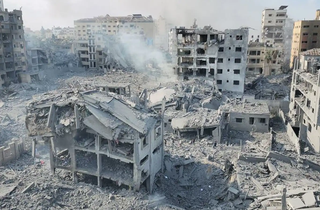Six months into the current military offensive, the destruction of housing and civilian infrastructure in Gaza has reached unprecedented levels. "Homes are gone, and with that, the memories, hopes, and aspirations of Palestinians and their ability to realize other rights," the experts said.
The systematic and widespread destruction represents a crime against humanity, a domicide, as well as numerous war crimes and acts of genocide, according to the UN Special Rapporteur on the Occupied Palestinian Territory.
The experts also expressed concern over the alleged use of AI systems by the Israeli military, such as "Gospel", "Lavender", and "Where's Daddy?". These systems, combined with lowered human due diligence, may explain the extent of the death toll and home destruction in Gaza.
More than 15,000 deaths, almost half of all civilian deaths so far, occurred during the first six weeks after October 7, when AI systems seem to have been largely relied upon for target selection.
The experts also expressed grave concern about the practice of bombing so-called "power targets" such as large, high rise residential and public buildings, especially in the first weeks of the war.
Between 60-70% of all homes in Gaza, and up to 84% of homes in northern Gaza, are either fully destroyed or partly damaged. The World Bank, UN, and EU estimate that damage to the Strip thus far is $18.5 billion or 97% of the total GDP of Gaza and the West Bank.
“The scale of destruction, with over 33,000 people killed and 1.7 million (75% of Gaza residents) displaced, makes it crystal clear that a reparative approach to rebuilding Gaza is essential. This approach starts with Israel, the occupying power, which has destroyed Gaza, as well as the countries that supplied military, material, and political support for the war and the occupation, all of whom bear both legal and moral responsibility,” the experts concluded. (ILKHA)



 Dünya
Dünya
 Dünya
Dünya
 Dünya
Dünya
 Dünya
Dünya
 Dünya
Dünya
 Dünya
Dünya
 Güncel
Güncel
 Güncel
Güncel
 Dünya
Dünya
 Dünya
Dünya





